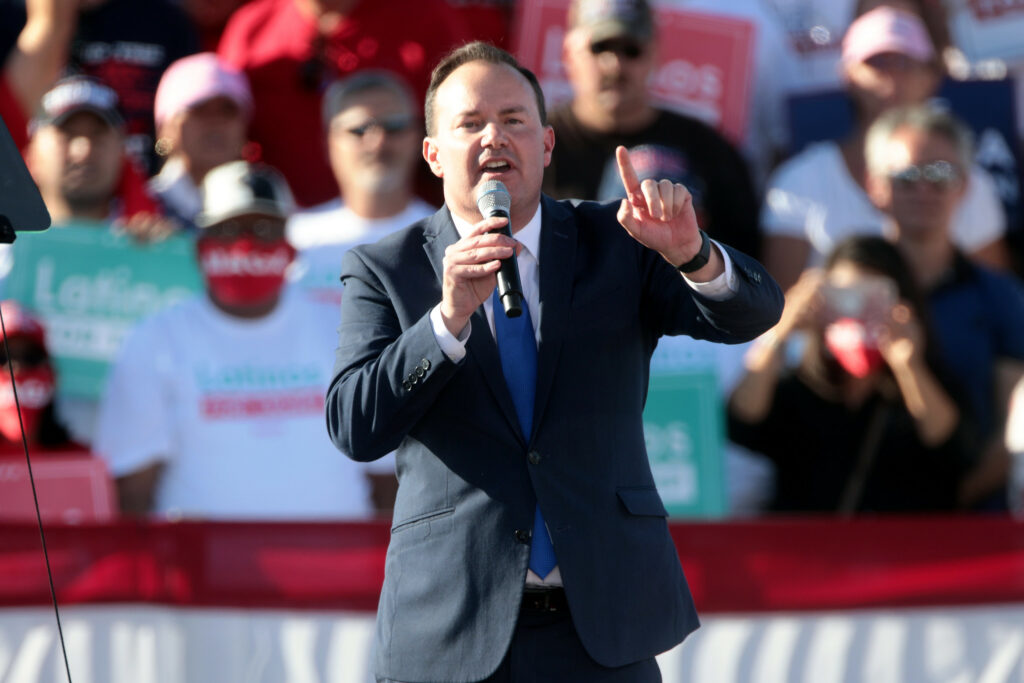Mike Lee’s Texts
He was clearly willing to subvert the election.

Mike Lee is a Republican Senator from Utah. He was elected to the Senate via the Tea Party movement in 2010. He styles himself as a “constitutional conservative” and seeks to project a certain level of seriousness, writing books like Our Lost Constitution: The Willful Subversion of America’s Founding Document (which is more than, say, Senator Tuberville is likely to be doing). I personally and professionally find his views on these subjects to be questionable, if not based in myth as well as overly simplistic but will accept that he does seem to have a legitimately formed set of views.
My longest exposure to the Senator was an interview for the Politics in Question podcast back in 2021. I came away from listening to that with the opinion that Lee seemed like a legitimately serious person (as far as politicians go), but whose ideas were, as noted above, founded substantially in mythology about the founding (but a mythology that is not uncommon in American society). In simple terms, he did not come across as part of the Marjorie Taylor Greene/Lauren Boebert wing of the party, nor as belonging to the Tommy Tuberville/Louie Gohmert brain trust. Further, he wasn’t as obnoxious as Ted Cruz nor as smarmy as Mitch McConnell. He struck me as someone with whom I disagreed, but who represented what one might reasonably hope for in an American elected official. Although I will say that a number of things I have seen him say on the floor of the Senate, and elsewhere, have raised questions about these assessments, but I have largely chalked that up to the general rubric of “politics.”
However, recently revealed text messages in and around the 2020 elections raise serious questions about Lee’s commitments to electoral democracy.
- CNN Exclusive: ‘We need ammo. We need fraud examples. We need it this weekend.’ What the Meadows texts reveal about how two Trump congressional allies lobbied the White House to overturn the election.
- READ: Mark Meadows’ texts with Mike Lee and Chip Roy
The texts that have been released (the full chain is in the second link above) are quite damning. They show a person who was willing to subvert the 2020 election if an argument could be made that he thought he could defend. The texts (excerpted below) come across to me as someone who has reached a conclusion and is simply trying to figure out evidence to fit it.
The best interpretation one can give to these texts, and the defense that Lee is likely to make is that he was simply pushing for all legal avenues to be exhausted. And, on one level, all well and good. But such a defense ignores the atmosphere that Trump and his allies were ginning up about the election in a way clearly detrimental to American trust in the election process itself. Further, as noted below, recourse to legal remedies ought to be in the context of real evidence of problems, not just because one wants a way to win an election that one has otherwise lost.
I will additionally say that none of this speaks well of Lee’s judgment. He pushes both Syndey Powell and Jim Eastman as possibly reliable allies for Trump (although he does back off of Powell pretty quickly the more he heard). This means his focus on legality was really based more on hopeful fantasies about the outcome of challenges, not some principled focus on some real potential problem that needed to be adjudicated. Indeed, the texts don’t ever make a claim about what went wrong directly but are focused on finding a pathway to accept alternative electors.
Here are some key texts.
He pushed Meadows to give Powell access on 11/7/22:
From Mike Lee to Mark Meadows Sydney Powell is saying that she needs to get in to see the president, but she’s being kept away from him. Apparently she has a strategy to keep things alive and put several states back in play. Can you help her get in?
From Mike Lee to Mark Meadows It was at the president’s request that Sydney has been working on a strategy and has been trying to get in to see him. But she’s being kept out.
From Mike Lee to Mark Meadows [Powell email address][Powell phone number] Sidney Powell
And then on 11/9:
From Mike Lee to Mark Meadows Sidney told us that the campaign lawyers who I do not know are not focused on this and are obstructing progress. I have no way of verifying or refuting that on my own, but I’ve found her to be a straight shooter. In any event, these actions need to be filed and announced in the next 48 hours or the public relations momentum we need to have behind it will start to dissipate.
So, he was clearly swayed by wishful thinking that his party won, even though all indications were the other way. As such, he found appeal in the sophistry of someone saying what he wanted to hear.
He at least figured out a week or so later (11/19) that Powell was a problem:
From Mike Lee to Mark Meadows I’m worried about the Powell press conference.
[…]
From Mike Lee to Mark Meadows Unless Powell can immediately substantiate what she said today, the president should probably disassociate himself and refute any claims that can’t be substantiated
The bottom line is, however, the lack of credibility on Powell’s part should have been clear from the start.
Yet, Lee continued to look for hope in all the wrong places (on 11/23):
From Mike Lee to Mark Meadows If you haven’t yet watched tonight’s episode of Life, Liberty, and Levin, you should do so if you can fit it in. Mark Levin makes a very compelling case for the need for litigation related to this election.
The ongoing evidence that the “serious” people get their info from pundits, unsurprising as it is, continues to astound.
And also along these lines of listening to anyone saying what he wanted to hear:
From Mike Lee to Mark Meadows John Eastman has some really interesting research on this. The good news is is that Eastman is proposing an approach that unlike what Sidney Powell has propose could be examined very quickly.
By 12/8 he moves from looking for other people to promote to a more action-oriented position:
From Mike Lee to Mark Meadows If a very small handful of states were to have their legislatures appoint alternative slates of delegates, there could be a path.
We have now moved here away from exhausting court-based options to actively looking for other ways to subvert the process.
On 12/16 he asked for guidance. Note he has reached a conclusion (that they could/should object) but he needs credible talking points to back up such an action. On the one hand, kudos (sorta) for wanting evidence, but a thousand points off for reaching the conclusion first and then looking for evidence to back that conclusion up.
From Mike Lee to Mark Meadows Also, if you want senators to object, we need to hear from you on that ideally getting some guidance on what arguments to raise.
From Mike Lee to Mark Meadows I think we’re now passed the point where we can expect anyone will do it without some direction and a strong evidentiary argument.
Basically: some of us are willing to object to the certified election results, we just need some public reason to do so.
On 1/3 he is willing to support alternate slates of electors:
From Mike Lee to Mark Meadows Everything changes, of course, if the swing states submit competing slates of electors pursuant to state law.
“Pursuant to state law” is kind of key here, since there was no way for the states to do differently than they did, save in, shall we say, creative ways.
Lee tells Meadows on 1/4 that he is still working on a way to object. Lee knows what he wants to do, he just needs “credibility”:
From Mike Lee to Mark Meadows It’s not your fault. But I’ve been calling state legislators for hours today, and am going to spend hours doing the same tomorrow. I’m trying to figure out a path that I can persuasively defend, and this won’t make it any easier, especially if others now think I’m doing this because he went after me. This just makes it a lot more complicated. And it was complicated already. We need something from state legislatures to make this legitimate and to have any hope of winning. Even if they can’t convene, it might be enough if a majority of them are willing to sign a statement indicating how they would vote.
From Mike Lee to Mark Meadows And I’ve been working on doing that all day today.From Mike Lee to Mark Meadows But now, my ability to do that with credibility is impaired.
How any of this is anything other than an ongoing attempt to find a way to subvert a legitimate election is beyond me. I know that defenders are going to say he was just trying to make sure that the slates of electors were legitimate and that all processes were legal, but such a position ignores the fact that to question the slates of electors or other parts of the process should require evidence first.
In simple terms, the way it is supposed to work is this:
- evidence of a problem —> investigation of problem —> conclusion that problem exists (or does not based on, you know, evidence).
It is not supposed to work like this:
- conclusion that problem exists —> finding evidence of problem to back up conclusion that problem exists
Lee first finds Powell appealing and when she turns out to be a kook, he looks to TV (Levin) and Eastman. From there he begs Meadows for talking points.
I fear a lot of this can be ascribed to his lawyerly training: the idea that once you know which side you are defending, you build your case. Of course, that works in a court of law, when both sides have the right to have their side argued. Such approaches are highly problematic when the participants in an argument ought to be more dedicated to what reality actually is, not just what one’s side wants it to be.
Most troubling of all is that this is just another example of a prominent member of the Republican Party who seems largely disinterested in defending democracy and far more interested in simply having his party win.
(More on Lee and on Chip’s Roys’ texts later).






This is what “legitimately serious persons” in the Republican Party are reduced to these days. Mike Lee is one of the GOP Senate’s great champions of the “We’re a Republic, Not a Democracy” framing, so his efforts in response to the 2020 election were par for the course. He is well aware of the reality that Republican policies are not popular enough to win in a democracy, so every anti-democratic tactic is in play.
The alternative is for Republicans to more broadly appeal to the electorate by moderating their policies. And that simply won’t fly with the donor class and nationalist base they serve.
“Mittens’ Romney recently was criticized in Utah for not endorsing Lee for reelection. Romney has remained mum on his reasons, but an assumption was that it had to do with Lee’s actions around the election. The Meadow’s texts lend credence to that assumption.
Lee, initially comes across a serious and intelligent conservative, but observation reveals him to be pretty one dimensional. Someone whose political philosophy is conservative, not because he came to his beliefs through an intellectual process, but because of religion. Yet he’s felt compelled to develop an intellectual construct to explain that.
Strange guy.
@Scott F.:
R policies are irrelevant to R voters. They are voting for the party for cultural and bias reasons. The Boston Globe has this article up; Red states send back millions in federal housing aid, putting rural renters at risk.
Red states refuse to expand Medicare under the ACA and will go as far as subvert the will of the voters if via initiative and referendum, the voters expand it. It doesn’t matter what Dems in DC do for R voters, they will never vote for them.
Mike Lee’s actions are reminiscent of a sort of quasi critical legal/post-modernist take that law and “legal” are whatever can be constructed to achieve consensus. (Tell me what we want to do, and I’ll devise a legal explanation for it.) Once upon a time, “constitutional conservatives” shunned such approaches. Then again, “constitutional conservatives” seem to have moved to being okay with “destroying the
Constitutionvillage in order to save it.” Oh well.A conclusion I came to years ago, and expressed in OTB comments section many times: the modern Republican Party is a danger to our democracy. Trying to find “one of the good ones” is like trying to find the intellectuals in the Sinaloa cartel. Even if they exist, what does it matter?
@Sleeping Dog:
To be clear, when your MO is anti-democracy, all policies are irrelevant to all voters. Autocrats don’t bother appealing to voters.
Echoes of 2000.
@MarkedMan:
I think that few in the Democratic Party or media are willing to honestly confront this fact and insist on seeing the subversion of democracy as merely hardball politics like one of those tv shows where the prosecutor and defense attorneys tear at each other in the courtroom then afterwards share a drink and a laugh.
The Republicans are telling us that they intend to rule, with or without the consent of the people.
There is simply no way this proposal can be reconciled with the laws, constitutions and court decisions of what Republicans are pleased to label the “contested states’. What Lee was suggesting was that if the Senate had on the one hand a state’s slate of electors duly certified by the governor of the state in accordance with the state’s laws, and on the other, a statement by Republican members of the state’s legislature that they believed Trump won, then the Senate was entitled to adopt the latter for the purposes of counting electoral college votes.
This, of course, is exactly what seven state Republicans sought to do by sending their ‘alternate electors’ lists to the Senate. Pence claims now that he never contemplated acknowledging them. Hopefully he’s telling the truth, but Americans can’t be confident a future vice president with
a friendly majority would do the same. Yet efforts to strengthen protection of election integrity were deemed less important then preserving the precious Senate filibuster, and even talk of amending the Electoral Count Act of 1887 seems to have died.
It’s hard to avoid the conclusion that Trump Republicans are determined to exploit the weaknesses 2020 exposed in the electoral system, and Democrats lack the energy or the will to stop them. The latter remind me more and more of their Weimar counterparts in the early 1930s.
Stephen, please note that (IMHO) Lee’s, problem was that it did not work out. He had no problem with it except failure.